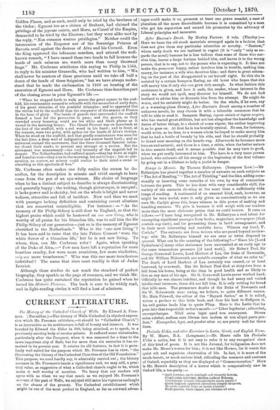CURRENT LITERATURE.
The History of the Cathedral Church of IVells. By Edward A. Free- man. (Macmillan.)—The history of Wells Cathedral (a slipshod expres- sion which Mr. Freeman criticizes,—it should be "Cathedral Church") is as instructive as its architecture is full of beauty and interest. It was founded by Edward the Elder in 909, being attached, so to speak, to a previously existing body of secular priests. It suffered some vicissitudes, particularly after the Conquest, when it was removed for a time to the more important city of Bath, but for more than six centuries it has re- mained in its present seat. It retains its old features, in fact it is pecu- liarly well suited for the purpose which Mr. Freeman has in view, " the illustrating the history of the Cathedral Churches of the Old Foundation." This purpose, we need hardly say, is admirably carried out ; the history assumes in Mr. Freeman's hands a significance and, we may add, a prac- tical value, as suggestive of what a Cathedral church ought to be, which make it well worthy of mention. We fancy that our readers will agree with us when we say that mach as we enjoyed Mr. Freeman's account of the past of Wells, We enjoyed still more his vigorous onslaught on the abuses of the present. The Cathedral establishment which might be one of the most perfect in England, as far as outward advan- 1 tages could make it so, presents at least one grave scandal, a case of pluralism all the more discreditable because it is committed by a man who got his reputation and earned his promotion by the advocacy of Liberal principles and measures.






























 Previous page
Previous page